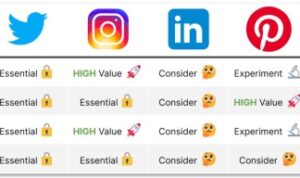Managing Brand Reputation Online is all about creating a positive image for your brand in the digital world. From enhancing customer trust to dealing with potential crises, this topic delves into the essentials of maintaining a strong online presence.
Importance of Managing Brand Reputation Online

In today’s digital age, managing brand reputation online is more crucial than ever for businesses. The online presence of a brand can significantly impact its success or failure in the market.
A positive online reputation can greatly enhance customer trust and loyalty towards a brand. When consumers see positive reviews, ratings, and interactions with a brand online, they are more likely to perceive the brand in a favorable light. This can lead to increased customer retention, higher sales, and positive word-of-mouth referrals.
Conversely, ignoring or mismanaging brand reputation online can have severe consequences. Negative reviews, comments, or scandals spread quickly in the digital realm and can tarnish a brand’s image in an instant. This can result in loss of customers, damaged credibility, and a decline in overall business performance.
Impact on Customer Trust and Loyalty
Maintaining a positive online reputation is essential for building and sustaining customer trust and loyalty. Here are some ways a positive online reputation can impact customer perceptions:
- Increased credibility: Positive online reviews and ratings can enhance a brand’s credibility in the eyes of consumers, making them more likely to trust the brand and its products/services.
- Enhanced customer experience: Brands with a positive online reputation are perceived as more reliable and trustworthy, leading to a better overall customer experience.
- Brand advocacy: Satisfied customers are more likely to become brand advocates and recommend the brand to others, contributing to increased brand loyalty and customer retention.
Strategies for Building a Strong Online Brand Reputation
In today’s digital age, building a strong online brand reputation is crucial for the success of any business. With the vast reach of the internet, it is important for businesses to implement effective strategies to establish and maintain a positive online presence.
Proactive vs. Reactive Approaches, Managing Brand Reputation Online
One of the key strategies for building a strong online brand reputation is to differentiate between proactive and reactive approaches. Proactive strategies involve actively engaging with customers and stakeholders to build a positive image before any issues arise. This can include creating engaging content, responding to queries promptly, and seeking feedback to improve products or services.
On the other hand, reactive approaches involve addressing issues or negative feedback as they arise. While reactive strategies are necessary in handling crises or resolving conflicts, it is important for businesses to focus more on proactive measures to prevent such situations from occurring in the first place.
Monitoring and Responding to Online Feedback
Monitoring and responding to online feedback and reviews is another important aspect of managing brand reputation online. Businesses should regularly monitor social media channels, review sites, and other online platforms to stay informed about what customers are saying. Responding promptly and professionally to both positive and negative feedback shows that the business values customer input and is committed to addressing concerns.
In addition, implementing best practices such as addressing complaints privately, thanking customers for positive feedback, and seeking to resolve issues in a transparent manner can help businesses build trust and credibility with their audience.
Dealing with Negative Feedback and Crisis Management: Managing Brand Reputation Online
In the digital age, negative feedback and criticism online can spread like wildfire and severely damage a brand’s reputation. It is crucial for companies to have effective strategies in place to handle such situations with professionalism and transparency.
Handling Negative Feedback
When faced with negative feedback online, companies should first acknowledge the issue and respond promptly. It is important to address the concerns raised and offer a solution or explanation. Ignoring negative feedback can escalate the situation and harm the brand’s reputation further.
- Monitor social media channels and review sites regularly to stay on top of any negative feedback.
- Respond to complaints publicly, but take sensitive conversations offline to resolve them privately.
- Show empathy and understanding towards the customer’s concerns, and provide a genuine apology if necessary.
- Take responsibility for any mistakes and demonstrate a willingness to make things right.
Crisis Management Strategies
In times of brand reputation crises, companies need to act swiftly and decisively to mitigate the damage. Successful crisis management requires a well-thought-out plan and clear communication with stakeholders.
- Have a designated crisis management team in place to handle emergencies effectively.
- Be transparent about the situation and provide regular updates to keep customers informed.
- Offer solutions or compensation to affected parties to restore trust and goodwill.
- Learn from the crisis and implement changes to prevent similar incidents in the future.
Importance of Transparency and Authenticity
Transparency and authenticity are key elements in addressing online issues and rebuilding trust with customers. Being open and honest about mistakes shows integrity and a commitment to making things right.
- Admitting fault and taking corrective actions can actually enhance a brand’s reputation in the long run.
- Engage with customers openly and authentically to build lasting relationships based on trust.
- Consistency in communication and actions will help establish credibility and loyalty among consumers.
Leveraging Social Media for Brand Reputation Management

Social media plays a crucial role in shaping brand reputation online, serving as a powerful tool for businesses to connect with their audience and manage their brand image effectively. By leveraging social media platforms, companies can enhance their visibility, engage with customers in real-time, and build a loyal community around their brand.
Utilizing Social Media Platforms
- Establishing a strong presence: By creating profiles on popular social media platforms such as Facebook, Instagram, Twitter, and LinkedIn, businesses can showcase their brand personality and values to a wide audience.
- Engaging with followers: Regularly interacting with followers through comments, direct messages, and live chats can help foster a sense of community and loyalty among customers.
- Sharing valuable content: Posting relevant and engaging content, such as blog articles, videos, and infographics, can position the brand as an authority in its industry and attract more followers.
Risks and Benefits of Social Media for Brand Reputation
-
Risks: Negative feedback or comments can quickly spread on social media, potentially damaging the brand’s reputation if not handled properly. Additionally, misinformation or viral trends can also impact how the brand is perceived online.
-
Benefits: Social media allows for real-time communication with customers, enabling businesses to address issues promptly and showcase their commitment to customer satisfaction. It also provides valuable insights into customer preferences and trends, helping businesses tailor their marketing strategies accordingly.





